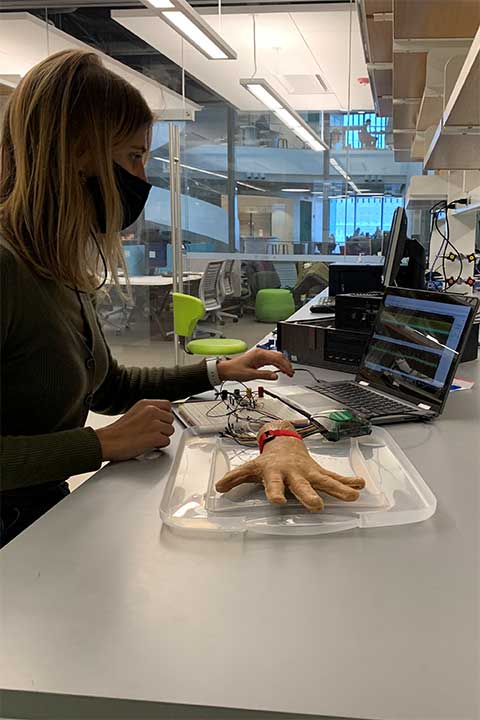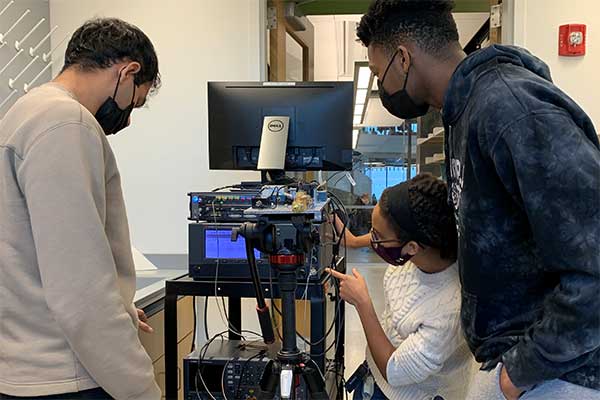
Master of Science in Internet of Things
Master of Science in Internet of Things
Driving the IoT Revolution
The interdisciplinary Master of Science, MS, in Internet of Things prepares highly qualified researchers and specialized professionals to lead the development of the Internet of Things (IoT)—a globally interconnected continuum of untethered devices and objects interacting with the physical environment, people, and each other. This joint program is offered by Northeastern’s Institute for the Wireless Internet of Things and the Department of Electrical and Computer Engineering in the College of Engineering, together with the Khoury College of Computer Sciences.
Students gain the interdisciplinary knowledge and skills to understand, design, implement and test the autonomous wireless networked systems of tomorrow—operating in uncertain, challenging, and extreme environments—through a combination of coursework, master’s thesis, supervised research spanning multiple colleges at Northeastern University, and/or industry experience.
This program is suited to students with a background in electrical and/or computer engineering, computer science, or related disciplines. Strong candidates in other STEM disciplines, including both engineering and sciences (e.g., physics, math) with prior exposure to calculus, linear algebra, probability theory, and programming, will also be considered.
Innovative Curriculum
Students will gain a rich education to contribute to the Internet of Things revolution through an interdisciplinary curriculum spanning multiple departments. Core courses covering both electrical and computer engineering will be complemented by courses in entrepreneurship, policy, business, and security. To personalize their paths, students can choose electives from within the College of Engineering, as well as across the university, in business, computer sciences, law, and health sciences.
The program offers an integrated path covering the three key components of the IoT: the Internet (communication networks), the Things (embedded systems), and an overlaying pervasive intelligence (AI, data analytics and optimization). Key topics include nanoelectronics, embedded systems, communications, networking, signal processing, data analytics, machine learning, policy, and entrepreneurship. Elements of ethics and value sensitive design are also part of the program, to complement technology planning with human values and inclusion principles.
- Understand the state-of-the-art solutions relating to the building blocks from the IoT, from sensors and embedded systems, through communication and networking, to data application and analytics.
- Design, implement and orchestrate IoT systems, utilizing theoretical, numerical, and experimental tools.
- Anticipate and adapt to new distributed data application requirements, networking architectures and communication techniques.
Experiential Learning
The MS in Internet of Things combines coursework with supervised research and/or industry experience. Students will conduct their research and experiential projects at the Institute for the Wireless Internet of Things, a leading center for next-generation wireless and wired communication networks—with emphasis on 6G wireless systems, machine learning for network orchestration and management, and overall large-scale experimental research.
Students will have the use of testbeds such as Colosseum, the world’s largest wireless RF emulation platform, as well as X-Mili and TeraNova, the largest millimeter-wave and terahertz networking platforms in the United States. Students are also given exclusive access to on-campus FCC designated Spectrum Innovation Zones—among only a few such zones in the nation. Northeastern is also one of only a handful of universities to be part of the International Telecommunication Union (ITU), the United Nations’ specialized agency for information and communication technologies.
Northeastern is an R1 research institution ranked No. 1 in internships/co-ops by U.S. News and World Report. The Institute for the Wireless Internet of Things has strong relationships with major companies in the wireless, defense, computing, and manufacturing areas—creating unique co-op and research opportunities for students. Research at the Institute for the Wireless Internet of Things is supported by NASA, the Department of Defense, the National Science Foundation, and other leading institutions.
Northeastern combines rigorous academics with experiential learning and research to prepare students for real-world engineering challenges. Northeastern is an R1 research institution, rated among universities with the highest research activity.
The Cooperative Education Program, also known as a “co-op,” is one of the largest and most innovative in the world, and Northeastern is one of only a few that offers a co-op program for graduate students. Through this program, students gain up to eight months of professional experience employed in their field of interest as part of the academic curriculum, giving them a competitive edge upon graduation. Our dedicated team of co-op coordinators prepare students for the co-op experience through resume building, developing interview skills, and guiding professional development.

Program Goals
- Prepare students for careers relating to the Internet of Things across multiple industries.
- Provide a broad-based understanding of the IoT, in terms of technology, policy, and industry.
- Offer hands-on experiences through industry and government collaborations, along with Northeastern’s own advanced technology facilities.
It’s predicted that by 2023, there will be more than 14.7 billion machine-to-machine connections, or half of the total global connected devices and connections over the internet—up from a third in 2018. Multimillion-dollar investments from both public agencies and the private sector continue to drive the rapid growth of IoT devices.
IoT defines a truly cyber-physical system in which all types of physical devices, ranging from standalone sensors and actuators to home appliances and vehicles, are interconnected and able to autonomously interact with each other. This seamless connectivity enables many diverse applications in the fields of healthcare, home monitoring and automation, environmental monitoring and pollution control, smart grid and infrastructure management, real time monitoring of industrial processes, and intelligent transportation of people and goods, among many others.
With IoT devices proliferating in industry verticals and consumer markets such as healthcare, manufacturing, and retail—and growing rapidly in connected home and car applications—students will find wide-ranging career opportunities.
Academic Advising
The Academic Advisors in the Graduate Student Services office can help answer many of your questions and assist with various concerns regarding your program and student record. Use the link below to also determine which questions can be answered by your Faculty Program Advisors and OGS Advisors.
Admissions & Aid
Ready to take the next step? Review degree requirements to see courses needed to complete this degree. Then, explore ways to fund your education. Finally, review admissions information to see our deadlines and gather the materials you need to Apply.